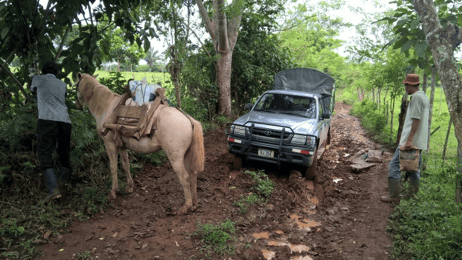
Since its construction four years ago, the Fred Strohbehn Training Center has hosted a great number of leaders from several communities in southeastern Nicaragua. Although many of the events and training sessions are held at the facility, which also serves as Self-Help’s main office in Nicaragua, Self-Help’s staff has traveled through mud, dust, ditches, and rain to reach communities in the most rural parts of Nicaragua in order to get to the communities of El Pajaro Negro, El Triunfo, Chontales, Santo Thomas, San Pedro de Lovago, and Muelle de los Buelles just to name a few. This year alone, the center has trained over 469 local community members.
No matter how difficult it may be at times to access the center from their rural communities, locals will find a way to get there— whether it be by truck, bus, horse, or walking long distances in order to attend the meetings, so that they can benefit from everything Self-Help has to offer.
The training center’s main mission is to provide these trainings and skills to all the people who can benefit by the programs offered, and for all of those who are interested. Farmers attend to learn how to manage and implement corn planting, harvesting, treatment of the land, and marketing with the QPM (quality protein maize) program. Others find interest in bringing clean water to their communities by using CTI-8 water chlorination systems. In addition, many more mothers and youth are taking interest in Self-Help’s micro-credit program, which provides training on how to use new and improved ovens, and teaches entrepreneurship by providing women the lessons they need to start up a small business.
In a typical training session at the center, the Country Director, Mr. Campos, explains the importance the health benefits of QPM, along with information about the three other programs’ benefits to create economic opportunity. During the most recent session, Self-Help was visited by a woman named Georgina, from the community of Loma Quemada. She discovered Self-Help through word of mouth from the San Carlos Rotary Club. Once she heard about the QPM program and the experimental plot in Quinta Lidia (located at Self-Help’s main office), she quickly requested that Self-Help’s Country Director share the QPM information with farmers from her community and to sign them all up for the next training session. When he agreed, she hurried home to her community and passed the news onto the rest of the farmers. A month later, all of the farmers showed up to the next available training session, ready to learn.

Community members planting in demonstration plots
Georgina is a prime example of how Self-Help reaches new communities. Inspired by what she had learned about QPM, she convinced all 25 farmers and leaders of three seed community banks to try something new. After a successful session, the farmers along with Mr. Campos, created a sampling plot in their own communities in which 10 farmers decided to use their own land as part of the trial. They planted QPM seed with several varieties (Fortaleza, Subtiava, Tepeyac, Nutrader, and a hybrid) in different plots to be compared with the commercial seed the farmers already knew (known most commonly as NB-6 and H-INTA 991). The new corn grew successfully.
 In addition to the new group of farmers were new mothers, who learned how to improve their recipes (bread, cakes, roasted chickens, and pizzas) for their personal businesses and learned how to best utilize new and improved ovens. Many of them requested to learn more about how they could get their own new-and-improved and environmentally-friendly oven, after seeing other women in their neighborhoods being met with success after receive a loan to build them through the program.
In addition to the new group of farmers were new mothers, who learned how to improve their recipes (bread, cakes, roasted chickens, and pizzas) for their personal businesses and learned how to best utilize new and improved ovens. Many of them requested to learn more about how they could get their own new-and-improved and environmentally-friendly oven, after seeing other women in their neighborhoods being met with success after receive a loan to build them through the program.
The women also learned how to utilize the fruit in their backyard by turning them into marmalades, jam, and pickling the vegetables that grow along with them. For Micro-Credit Program Officer Fletes, having youth involved is vital to breaking the cycle of poverty. In the most recent trainings, children observed their parents becoming leaders in their community and were eager to learn additional skills to expand their family’s business.

Excitement about the micro-credit program!
Some mothers also took a leadership role in their communities by becoming a part of their local clean water committees, so that they can stay updated in improving their community’s water treatment. One mother said, “It is not just up to one family member; it is a group effort that we ensure safe drinking water.”
With local farmers, mothers, and youth participating, it’s only a matter of time before more communities take interest in the center. The new San Carlos Rotary Club members now gather at the center regularly to host meetings.The conditions of the road in rural communities
The Nicaragua staff tells the community as they celebrate together amidst their success, “Our doors are open to anybody no matter their religious or political beliefs, our center is to be one for all and all for one.”

Powered by Wapiti Digital #servetheherd
This is my rich text.
This is more rich text.
I am a list
Lists are cool